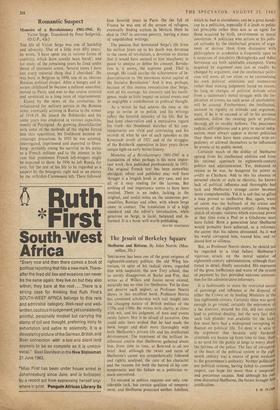The Jesuit of Berkeley Square
SHELBURNE has been one of the great enigmas of eighteenth-century politics; the old Whig his- torians, in spite of his radical views, regarded him with suspicion; the new Tory school, that so sternly disapproves of Burke and Fox, that writes as if Wilkes and Junius never existed, naturally has no time for Shelburne. Yet he does not deserve such neglect, as Professor Norris shows in this excellent book. Professor Norris has combined scholarship with real insight into the changing nature of British politics of the 1770s and 1780s. He writes with clarity, at times with wit, and his judgment of men and events rarely falters. Nor is he afraid of narrative: One could only have wished that he had made the book longer and dealt more thoroughly with both Shelburne's private life and his intellectual development. The treatment of the brilliant in- tellectual coterie that Shelburne gathered about him, from time to time, at Bowood is all too brief. And, although the twists and turns of Shelburne's career are sympathetically followed and rightly analysed, the core of his character and the reasons for both the hatred of hi,s con- temporaries and his failure as a politician re- main unresolved.
To succeed in politics requires not only con- siderable luck, but certain qualities of tempera- ment, and Shelburne possessed neither. Intellect,
which he had in abundance, can be a great handi- cap in a politician, especially if it leads to politi.
cal principles rather than acts as an agent foi those acquired by birth, environment or moral conviction. A politician,who arrives at his polit- cal attitudes by the intellectual process of argu- ment or derives them from discussion with philosophers or academics is frequently open' to a suspicion of instability (Bolingbroke and Adlai Stevenson are both admirable examples). Views acquired by argument may just as readily be changed by argument, and the intellectual politi- cian will seem, all too often, to be rationalising his own political ambitions and mantruvres4 rather than making judgments based on reason. So long as changes of political attitude arise from a statesman's moral struggle with the im-
plication of events, no such sense of unreliability will be created. Furthermore, the intellectual,
inclined to rigidity in attitude and argument,
must, if he is to succeed at all in his personal ambition, follow the twisting path of politics
through all its muddy hollows. The passionate radical, self-righteous and a prey to moral indig- nation, must always appear a dirtier politician than those who have been concerned with ex- pediency or allowed themselves to be influenced by events or by public mood.
Certainly much of the dislike of Shelburne sprang from his intellectual abilities and from his rational approach to eighteenth-century politics and administration. Yet, dedicated to reason as he was, he hungered for power as avidly as Chatham. Add to this his absence of personal charm or style or rhetoric, his known lack of political influence and thoroughly bad luck and Shelburne's strange career becomes more comprehensible. Yet it is sad that so gifted a man proved so ineffective. But, again, waste of talent was the hallmark of the sixties and seventies of the eighteenth century. Among the clutch of myopic vultures which exercised power at that time even a Peel or a Gladstone must have failed. Born a generation later Shelburne would probably have achieved, as a reformer, the career that his talents demanded. As it was his world corrupted him, wasted him, and re: duced him to silliness.
But, as Professor Norris shows, he should not be regarded as a total failure. Shelburne's vigorous attack on the moral squalor of eighteenth-century administration, although frus trated in detail, finally succeeded. His exposures of the gross inefficiency and waste of the system of payment by fees provided welcome arpmuni, lion for the administrative reformers.
It is fashionable to stress the restricted nature of patronage and influence at the disposal of either the Crown or its leading Ministers in the late eighteenth century. Certainly there was never enough to go round, certainly the enjoyment of a fat sinecure, secured for life, did not always lead to political docility, but the very fact that such rich plunder was available for the lucky few must have had a widespread corrupting in. fluence on political life. To deny it is akin to the argument that because only hardened criminals are beaten up from time to time, they is no need for the public at large to worry about the fairness of the police. The fact of -corruptioP at the heart of the political system in the eiglr teenth century was a source of great weakness to the government's authority. Neither politiciarIP nor political systems, having failed to command respect, can hope for more than a temporary and precarious success. And although his 001 time distrusted Shelburne, the future brought hir0 justification.
3. H. PLUMP






























 Previous page
Previous page